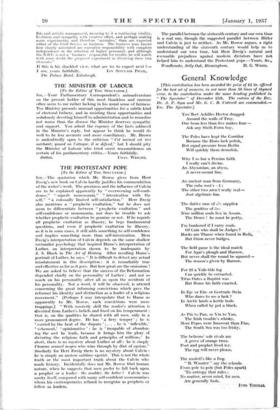THE PROTESTANT POPE [To the Editor of THE SPECTATOR.]
Sin,—The quotation which Mr. Rowse gives from Herr Zweig's new book on Calvin hardly justifies his commendation of the writer's work. The greatness and the influence of Calvin are to be explained apparently by " overweening self-confi- dence," " superb monomania," " intoxication with the self," " a colossally limited self-satisfaction." Herr Zweig also mentions a " prophetic exaltation," but he does not seem to differentiate between " prophetic exaltation " and self-confidence or monomania, nor does he trouble to ask whether prophetic exaltation be genuine or not. If he regards all prophetic exaltation as illusory, he begs fundamental questions, and even if prophetic exaltation be illusory, as it is in some eases, it still adds something to self-confidence and implies something more than self-intoxication. Herr Zweig's interpretation of Calvin depends on the same shallow rationalist psychology that inspired Hume's interpretation of
Luther, an interpretation shown to be inadequate by J. S. Black in The Art of History. After recalling Hume's portrait of Luther, he says, " It is difficult to detect any actual misstatement in this description : it is remarkably true and effective so far as it goes. But how great are the omissions !
We are asked to believe that the success of the Reformation depended chiefly on the personality of Luther : and not so much on his personality after all as upon the accidents of his personality. Not a word, it will be observed, is uttered concerning the great informing convictions which gave the reformer his identity and distinction as a leader of a religious
movement." [Perhaps I may interpolate that to Htune as apparently to Mr. Rowse, such convictions were mere trappings.] " With masterly skill the reader's attention is diverted from Luther's beliefs and fixed on his temperament that is, on the qualities he shared with all men, only in a more pronounced degree. He has ` a fiery temper' ; he is ` carried by the heat of the dispute ' ; . . . he is ' inflexible,'
' vehement," opinionative ' : he is ' incapable of abandon- ing the sect he leads, because it brings him the glory of dictating the religious faith and principles of millions.' In short, there is no mystery about Luther at all : he is simply l'homme sensual moyen who wins through by dint of egoism."
Similarly for Herr Zweig there is no mystery about Calvin : he is simply an austere sublime egotist. This is not the whole truth or the most important truth about the. Calvin who made history. Incidentally does not Mr. Rowse libel human nature, when he suggests that men prefer to fall back upon a prophet or a leader--the madder, the better ? Calvin Was sanity itself, compared with many self-confident monomaniacs whom his contemporaries refused to recognise as prophets or
follow as leaders.
The parallel between the sixteenth century and our own time is a -real one, though the suggested parallel between Hitler and Calvin is just to neither. As Mr. Rowse argues, a right understanding of the sixteenth century would help us to understand our own time, but Herr Zweig's natural and excusable prejudices against modern dictators have not helped him to understand the Protestant pope.—Yours, &c., Woodbrooke, Selly Oak, Birmingham. H. G. WOOD.






































 Previous page
Previous page